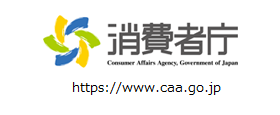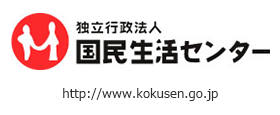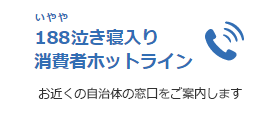Provision of Specified Continuous Services
The provision of Specified Continuous Services is transactions in which the provision of long-term and continuous services is promised in exchange for the payment of expensive fees.Currently, six services are included such as esthetic salons, language schools, home tutors, cram schools, marriage agencies, and personal computer schools.
for more information please visit Act on Specified Commercial Transactions
Please see here for Q&A about the Provision of Specified Continuous Services
"Provision of Specified Continuous Services" subject to the Specified Commercial Transactions Act.
1.Sales Form (Article 41 of the Act)
"Specified Continuous Services" means the provision of "Specified Continuous Services"(*) specified by Cabinet Order for a period exceeding a certain period by receiving compensation exceeding a certain amount. This includes the sale of rights to receive the provision of services, which is called the "sale of specified rights." Contracts concluded in stores will be subject to the Specified Commercial Transactions Act if they meet the above conditions.
* "Specified Continuous Services" means services that the recipient is induced to receive through the claim that they will increase the recipient's physical beauty, increase the recipient's knowledge or skills, or cause the recipient to accomplish any other purpose, the nature of which makes it uncertain whether such purposes will be accomplished.
2.Designated Services
Currently, the following six services are designated as Specified Continuous Services.
| Specified Continuous Services | Period | Amount of consideration |
|---|---|---|
|
So-called esthetic salons Esthetic salons perform treatment to purify or beautify a person's skin, fix the body shape, or the lose weight. |
The services that continue for than one month |
More than fifty thousand yen for each service |
|
So-called language schools Language schools teach languages (excluding that fall under the teaching for the improvement of academic ability to prepare for school entrance examinations to supplement education in schools other than universities). |
The services that continue for more than two months |
|
|
So-called home tutors Home tutors teach students for the improvement of academic ability to prepare for school entrance examinations (excluding elementary schools and kindergartens) or to supplement school education (excluding universities and kindergartens) (limited to those provided at places other than so-called cram schools). |
The services that continue for more than two months |
|
|
So-called cram schools Cram schools teach students of schools (excluding universities and kindergartens) to improve their academic ability to prepare them for school entrance examinations or to supplement the school education (limited to those provided at an office(s) of a service provider or other places prepared by the service provider for the purpose of the provision of said services). |
The services that continue for more than two months |
|
|
So-called personal computer schools Personal computer schools teach knowledge or techniques pertaining to the electronic computers or word processors. |
The services that continue for more than two months |
|
|
So-called marriage agencies Marriage agencies introduce opposite seeks the person to a person of the opposite sex who seeks to get married. |
The services that continue for more than two months |
(*1) Teaching in preparation for "competitive entrance examinations" for prestigious elementary schools and kindergartens are not included in "home tutors" and "cram schools."
Services (courses) targeting only Ronin students (meaning students who failed the entrance examinations and are preparing for one next year) do not fall under "cram schools" (courses that target both high school students and Ronin students fall under cram schools as a whole).
(*2) The service will fall under "Specified Continuous Services" if the total amount of the contract money in the name of entrance fee, tuition fee, educational material fee, the sale of related goods, etc., is more than fifty thousand yen.
(*3) Services for which contents are provided via fax, telephone, the Internet, postal mail, etc. also fall under "Specified Continuous Services."
3.Exclusion from Application (Article 50 of the Act)
The Specified Commercial Transaction Act does not apply to the following cases, etc.
- Transactions between business operators
- Contract with a person living overseas
- Sales or provision of services by the national or local governments
- Sales or provision of services by a partnership established based on a special law, an employee organization of government employees, or a labor union, to their respective members
- Sales or provisions of services by a business operator to its employees
Control on Provision of Specified Continuous Services
1.Delivery of Documents (Article 42 of the Act)
The Specified Commercial Transactions Act provides that when a business operator concludes a contract for the provision of Specified Continuous Services (sales contract for specified rights), such business operator must deliver the following documents to the consumer.
A. Prior to the conclusion of a contract, a document containing an outline of the contract (outline document) must be delivered.
The Act provides that the following matters must be described in the "outline document."
- Name, address, and telephone number of the provider, and the name of the representative in the case of a juridical person
- Contents of the service
- If there are any goods that must be purchased, the name, type, and amount of such goods
- Estimation of the compensation for the service (selling price of the right) or any other amount that must be paid
- Timing and means of paying the aforementioned amount
- The service period
- Information about cooling-off
- Information about mid-term cancellation
- Information about the right to assert an affirmative defense against credit companies under the Installment Sales Act
- Information about maintenance of the advance payments received
- If there are special provisions, the details of such provisions
B. Upon the conclusion of the contract, a document clarifying the contents of the contract (contract document) must be delivered without delay.
The Act provides that the following matters must be described in the "contract document."
- Contents of the service (right), if there are any goods that must be purchased, the name of the goods
- The amount of the consideration for the service (selling price of the right) and any other amounts that must be paid
- Timing and means of paying the aforementioned amount
- The service period
- Information about cooling-off
- Information about mid-term cancellation
- Name, address, and telephone number of the business operator, and the name of the representative in the case of a juridical person
- Name of the person in charge of the conclusion of the contract
- Date of the conclusion of the contract
- If there are any goods that must be purchased, type and amount of such goods
- Information about the right to assert an affirmative defense against credit companies under the Installment Sales Act
- Availability of a measure for maintenance of advance payment received, and its content
- If there are any goods that must be purchased, the name, address, and telephone number of the business provider who sells such goods, and the name of the representative in the case of a juridical person.
- If there are special provisions, the details of such provisions
- TIPS
- In addition, a note for consumers to the effect that documents should be carefully read must be written in red and circled with red. The information about cooling-off must also be written in red and circled with red in the contract document. Moreover, the font size on documents needs to be 8 points or more (the font size in the official gazette).
2.Prohibition of Misleading Advertising (Article 43 of the Act)
With regard to contents of the services, etc., the Specified Commercial Transactions Act prohibits an "indication that differs vastly from the truth" or an "indication that misleads people into believing that it is vastly better or more advantageous than it is in reality" in order to prevent consumer problems caused by misleading advertising, or advertisements which vastly differ from the truth.
3.Prohibited Conduct (Article 44 of the Act)
The Specified Commercial Transactions Act prohibits the following unjust acts in the provision of Specified Continuous Services.
- Misrepresentation in soliciting the conclusion of a contract or after the conclusion of a contract, to prevent the cancellation of the contract
- Intentional failure to disclose factual information in soliciting the conclusion of a contract or after the conclusion of a contract, to prevent the cancellation of the contract
- Intimidation to overwhelm a counterparty in soliciting the conclusion of a contract or after the conclusion of a contract, to prevent the cancellation of the contract
4.Inspection of Documents (Article 45 of the Act)
Business operators who conduct the Provision of Specified Continuous Services, for which the consideration is more than fifty thousand yen to be "paid in advance," are obligated to prepare documents describing their business and financial status (such as a balance sheet, profit and loss statement, etc.), as well as to make such documents available at any time to consumers, so that consumers can review the business operator's financial conditions, etc.
5.Administrative Dispositions and Penalties
A business operator who violated the above administrative controls becomes subject to penalties in addition to administrative disposition such as an instruction of business improvement (Article 46 of the Act) or business suspension order (Article 47 of the Act).
6.Cancellation of a Contract (Cooling-off System) (Article 48 of the Act)
Even if a consumer concluded a contract in the Provision of Specified Continuous Services, the consumer may cancel the contract (including sales contracts for related goods*) (cooling-off) by writing to the business operator within 8 days after receiving the documents specified in laws.
It should be noted that a consumer may execute cooling-off even after the above period has passed for a contract concluded on or after November 11, 2004 if the consumer misunderstood cooling-off, or was overwhelmed so as not to execute cooling-off because of the business operator's misrepresentation or use of intimidation. (The use of certified mail, registered mail, content-certified mail, etc., is recommended for cooling-off in order to avoid future problems.)
- TIPS
-
If the consumer has already received goods or rights at the time of cooling-off, the goods or the rights may be returned to the seller at the seller's expense. Moreover, even if the services were already provided, consumers do not need to pay the consideration for them. Consumers do not need to pay compensation for damages or penalties either, and if the consumer has already paid a consideration such as a deposit, the paid amount will be immediately returned.
However, please note that cooling-off provisions do not apply to the cases where the goods for which the value is almost lost by usage, so-called consumables (e.g., health foods, cosmetics, etc.), have been used.
*"Related goods" means goods specified by Cabinet Order as goods that a consumer needs to purchase when provided with Specified Continuous Services. If a consumer executes cooling-off (or mid-term cancellation) of a Specified Continuous Service Contract,
such consumer can also execute cooling-off (or mid-term cancellation) for its related goods.
Specifically, the following goods are designated as related goods.For esthetic salons:
・So-called "health foods"
・Cosmetics, soaps (excluding pharmaceutical products), and bath agents
・Underwear and electric facials, depilatory devicesFor language schools, home tutors, cram schools:
・Books (including educational materials)
・Audio tapes, CDs, CD-ROMs, DVDs, etc.
・Facsimile devices, videophones
For personal computer schools:
・Electronic computers, word processors, and parts and accessories pertaining to them
・Books, audio tapes, CDs, CD-ROMs, DVDs, etc.For marriage agencies:
・Pearls, gems, and semi-precious stones
・Rings and other personal accessories
7.Mid-Term Cancellation (Article 49 of the Act)
A consumer can execute a prospective cancellation (mid-term cancellation) of a Specified Continuous Services Contracts, etc. (including sales contracts for related goods) even after the cooling-off period has passed. The upper limit of the amount business operators can claim from a consumer for damages, etc. are as provided below (if the business operator has already received more than these amounts, the business operator must refund the excess amount).
|
When the contract is canceled before the provision of the services The following amounts specified for each service by Cabinet Order as the amount of costs normally required for concludinge and performing a contract |
|
|---|---|
| Esthetic salons | Twenty thousand yen |
| Language schools | Fifteen thousand yen |
| Home tutors | Twenty thousand yen |
| Cram schools | Eleven thousand yen |
| Personal computer schools | Fifteen thousand yen |
| Marriage agencies | Thirty thousand yen |
|
B. When the contract is cancelledcanceled after the provision of the service (Sum of a and b) a. The amount equivalent to the consideration for the Specified Continuous Services provided b. The following amounts specified for each service by Cabinet Order as the amount of damages that are normally caused by the cancellation of the relevant Specified Continuous Services Contract |
|
|---|---|
| Esthetic salons | The lesser of either twenty thousand yen or the amount equivalent to 10% of the remaining contract money |
| Language schools | The lesser of either fifty thousand yen or the amount equivalent to 20% of the remaining contract money |
| Home tutors | The lesser of either fifty thousand yen or the amount equivalent to the tuition fee for one month of the relevant |
| Cram schools | The lesser of either twenty thousand yen or the amount equivalent to the tuition fee for one month of the relevant Specified Continuous Service Contract |
| Personal computer schools | The lesser of either fifty thousand yen or the amount equivalent to 20% of the remaining contract money |
| Marriage agencies | The lesser of either twenty thousand yen or the amount equivalent to 20% of the remaining contract money |
*"Remaining contract money" means the amount obtained by subtracting the amount equivalent to the consideration for the services already provided from the total amount of the consideration pertaining to the contract.
8.Rescission of the Manifested Intention to Offer a Contract or to Accept Such Offer (Article 49-2 of the Act)
If a consumer manifested the intention to offer a contract or to accept such offer under the misunderstanding in each of the following cases as a result of the following acts of the business operator in soliciting the conclusion of the contract, the consumer may rescind the manifested intention for contracts concluded on or after November 11, 2004.
- In the case of misrepresentation, the misunderstanding that the information being represented was true
- In the case of intentional failure to disclose factual information, the misunderstanding that the relevant facts did not exist
9.Demand for Injunction against Business Operator's Conduct (Article 58-22 of the Act)
If a service provider or a seller has performed, or is likely to perform the following acts to many and unspecified persons, a Qualified Consumer Organization may demand that each of such business operators discontinue or prevent the relevant conduct, or take any other necessary measures.
- Indication of misleading advertisements
- Misrepresentation in soliciting the conclusion of a contract.
- Intentional failure to disclose factual information in soliciting the conclusion of a contract
- Intimidation to overwhelm a person to conclude a contract, or to prevent its cancellation
- Act of concluding a contract that includes special provisions which are disadvantageous to consumers, or special provisions against the limitation of the amount of damages for the cancellation of a contract (As for sales contracts for related goods, acts by the seller of such related goods).



